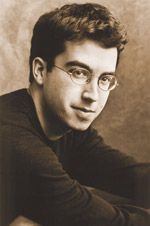The Hum Inside the Skull

A little more than 20 years ago, the Book Review of The New York Times asked a group of fiction writers, age 40 or younger, to name the writer or writers who had most influenced their work and to explain how. It seemed like a good time to put the same question to a new generation of young writers. Here we quote an excerpt from Jonathan Safran Foer's reply.
«I can't read most of my literary heroes -Ovid, Kafka, Rilke, Schulz, Grass, García-Márquez, Amichai- in their original languages. And the books I've been most inspired by in the past year -Garden, Ashes, by Danilo Kis; The Noodle Maker;' by Ma Jian; Blindness, by José Saramago; Sayonara, Gangsters by Genichiro Takahashi; My Name Is Red, by Orhan Pamuk- were written in Serbo-Croatian, Chinese, Portuguese, Japanese and Turkish, respectively. Maybe it's a coincidence. I'm not aware of connecting with these books because of their foreignness. Just the opposite. I love them for their ability finally to describe the personal and familiar. It just so happens that those descriptions were made with words I can't understand.
Shamefully, fewer than 3 percent of literary books published each year in the United States are translated from foreign languages, compared with vastly higher percentages (25-45 percent) in virtually every other country. And much of our 3 percent consists of retranslations of classics, so the real number for new foreign voices is quite a bit lower. We focus virtually all of our political and military attention on the Middle East, but how many of us could claim to have read a single work of Arabic literature in translation? For a citizen, it's scary to contemplate a future in which relations with those we need to relate to are diplomatic, and not humane. It's with art, after all, that a culture best expresses its humanity.
And as a writer, I know that without being a participant in the conversation of cultures -being a talker, but not a listener- I will be a lesser writer. Like science, art depends on the experiments of others. The great advances are made not by individuals so much as by environments. (It's no coincidence that innovations tend to come in bundles.) In this way, it's a terrible moment to be an American writer.
Or an American reader. Sometimes I think of the books I'll never read that would have changed my life. (There should be a word for that missed connection. Maybe another language has such a word. . . .) And who doesn't want to have more heroes? Who doesn't want to be as inspired as possible?»
Read the complete article: The New York Times, Sunday Book Review
Jonathan Safran Foer
Jonathan Safran Foer is the author of the bestseller Everything Is Illuminated, named Book of the Year by the Los Angeles Times and the winner of numerous awards, including the Guardian First Book Prize, the National Jewish Book Award , and the New York Public Library Young Lions Prize. Foer was one of Rolling Stone's «People of the Year» and Esquire's «Best and Brightest.» Foreign rights to his new novel have already been sold in ten countries. The film of Everything Is Illuminated, directed by Liev Schreiber and starring Elijah Wood, will be released in August 2005. Extremely Loud and Incredibly Close has been optioned for film by Scott Rudin Productions in conjunction with Warner Brothers and Paramount Pictures. Foer lives in Brooklyn, New York.
Further information: An interview with Robert Birnbaum



